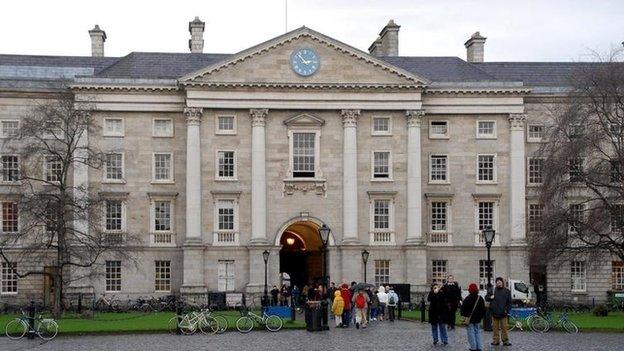Dublin universities may change NI exam admissions criteria
- Published

Trinity College Dublin is examining its entry requirements for Northern Ireland students
Two of the Republic of Ireland's leading universities are considering an increase in their intake of students from Northern Ireland.
Many popular courses at universities in the Republic are inaccessible to Northern Ireland students.
This is due to a system that compares A-level results with the Republic's Leaving Certificate qualification.
Now, Trinity College Dublin and Dublin City University say they want to change entry requirements for NI students.
Sixth-form pupils in Northern Ireland sit A-level exams, whereas students in the Republic sit Leaving Certificate exams.
Most pupils in Northern Ireland study for three A-levels, whereas pupils in the Republic study for least six Leaving Certificate subjects.
In 2005, a points system was devised to help universities on both sides of the border compare the results of pupils taking the different exams.
However, that has meant that many Northern Ireland pupils cannot apply for popular courses in the Republic unless they do four A-levels.
In the 2011/12 academic year - the most recent for which there are figures - only 925 out of almost 7,500 pupils in Northern Ireland took four A-level exams.
Brightest
Under the current points system, the top A-star grade at A-level is worth 150 points, whereas the top A1 grade in a Leaving Certificate subject is worth 100 points.
Therefore a student getting six top grades at Leaving Certificate level will get 600 points, whereas a student getting top grades in three A-levels can only achieve 450 points.
Most popular courses at Irish universities - such as law, maths or psychology at Trinity College Dublin - require a pupil to get well over 500 points to apply for entry.
Janet Goodall, a senior teacher at Portora Royal School in Enniskillen, says that this means some of their brightest pupils cannot apply to southern universities.
"I have one student who is likely to achieve an A-star in A-level maths and an A-star in further maths."
"Because he is not doing four A-levels, he will have no access to study maths at Trinity."
Prof Brian Walker of Queen's University Belfast is a Trinity graduate. He says that it is vital that the admission procedures are changed.
"Trinity has a tradition as a major educational institution with an open door to people of talent from every part of Ireland," he says.
"That has been lost and it needs to get back to that."
Different
The Dean of Undergraduate Studies at Trinity, Dr Patrick Geoghegan, says that he wants the university to consider unilaterally adopting a different scoring system for applicants from Northern Ireland.
In 2012, the university admitted only 77 new undergraduates from Northern Ireland out of a total of 3,759 students - just over 2% of the total.
In the Republic as a whole, Northern Irish students account for just over 1% of the university population.
By contrast, 1,118 first-year undergraduates from the Republic were admitted to Northern Ireland universities in 2011/12 - the most recent year for which there are figures - which is about 7% of the total.
This is despite the fact that university undergraduate tuition fees in the Republic are currently lower at 2,500 euros (拢2,072) a year compared to 拢3,575 in Northern Ireland.
In a statement, Dublin City University said it was also "exploring the development of a special entry route mechanism for Northern Ireland students".
- Published23 May 2012
- Published1 May 2012
- Published30 January 2012
- Published8 September 2011